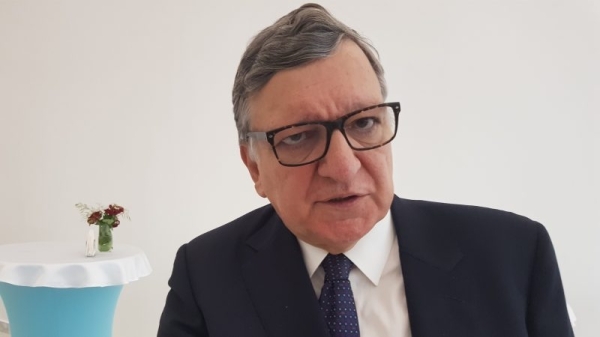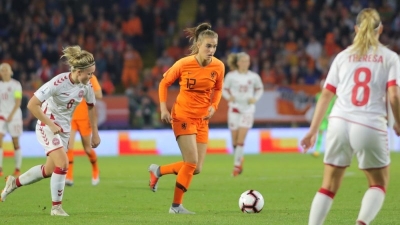Barroso: I am proud I launched the enhanced partnership with Kazakhstan

Speaking to EURACTIV in Astana, former European Commission president José Manuel Barroso talked about Russia, EU sanctions and their impact on Kazakhstan, but also about some important decisions he took when he was in charge of the EU, a time he described as the “geopolitical adolescence” of Europe.
Speaking on the first day of the Astana International Forum, you were the only one who dared to defend the EU sanctions as an adequate reaction of the Western community in the context of the Russian aggression against Ukraine, while some other speakers, including the hosts from Kazakhstan, were against. Can you elaborate?
I fully understand the concerns of countries like, for instance, Kazakhstan. In politics, we always need to think counterfactually. We cannot say, “This is not good”; we need to say what would be the alternative.
I remember in 2014 when the first sanctions were adopted in the context of the annexation of Crimea, we discussed in the European Council what we could do. In principle, when there is an aggression of one country to another in Europe, there are three options.
One is to go to war. Another one is to do nothing or make a diplomatic communiqué saying it’s very regrettable. And there is a middle-of-the-road option to adopt sanctions to put a cost on the aggressor.
Personally, I think sanctions have very limited effect. If they were effective, North Korea would not have nuclear weapons, and Iran would have stopped their nuclear program. But at the end of the day, this was the reaction of the countries of the European Union, showing our common condemnation at a cost to the aggressor.
In the case of Kazakhstan, it’s important to mention that 40% of the trade of this country is with Europe, so the EU is by far the most important trade and investment partner. And the countries of the European Union are also feeling the pain of sanctions because there have been countersanctions and because of our very heavy dependence on Russian gas.
It’s also European households, it’s not only third countries like Kazakhstan who are indirectly suffering from sanctions. So, in a nutshell, I argue that the EU sanctions are legitimate.
But even IMF Managing Director Kristalina Georgieva warned against “fragmentation” of the world economic order as a result of building political alliances against economic logic…
I think she was expressing concerns about the economic fragmentation, not necessarily about the sanctions. Yes, that’s a problem. I personally believe that there is a real risk of de-coupling globally, and that’s what Kristalina Georgieva highlighted, and I fully agree with her.
But again, I understand the Kazakhstan position. I am proud that I launched the negotiations for an enhanced cooperation agreement now in force. And I think what the Kazakhs are doing makes a lot of sense.
They are very close to Russia and China for obvious reasons, but they want to develop more relations with Europe, they don’t want to be closed in the region. I think that makes sense, and what they need to do is invest in connectivity in the five Central Asian countries and have corridors between Europe, reaching Asia. And while in Kazakhstan, there is some discomfort with the impact of sanctions on their own country, at the same time, I think they understand EU’s priorities and concerns, and they very much want to develop relations with the EU.
I no longer represent the EU, but I remain a very committed European, and I am giving you my honest personal opinion: the EU had no alternative but to adopt sanctions.
As Commission president, in 2014, you made a powerful statement that resulted in stopping the South Stream project, intended to bring Russian gas to Europe via Bulgaria.
I think it was the right decision at that time. I was concerned with the heavy dependence of Bulgaria on Russian gas. At that time, I also went to Azerbaijan, and with President (Ilham) Aliyev, we launched the project of the Southern gas corridor, including the Trans-Adriatic pipeline. And I think we made the right decisions. In terms of risk management, at that time, it was already clear that diversification is a way of protecting us and to de-risk. Hopefully not to de-couple completely but not to be overly dependent on one country for our European interest.
But we were a little bit naïve at that time, we Europeans?
Look, I know that criticism. But I think it’s a little bit unfair to judge the decisions of the past with the glasses of the present. At that time, we were trying to engage positively with Russia. Was it wrong? I think not.
There was a time when you were Commission president, visa liberalisation was on the EU agenda with Russia…
Exactly, and we had the Partnership for Modernisation when Medvedev was president.
Would we have a different relationship with Russia if Vladimir Putin followed another path?
Look, I believe Russia is part of the European civilisation. I wouldn’t make a confusion between the huge strategic mistake of Putin and what Russia represents as a civilisation. I have a deep feeling for the young Ukrainians that are dying, but also for the young Russians that are dying because of the criminal mistake of their president.
So we were not wrong in trying to engage positively with Russia. This was, at that time, what could be done. Our European naiveté is that we think others are going to change. That’s not true. Most developments, from Turkey to Iraq, depend more on internal causes than on external conditions. That’s important to be remembered and more modest in the future.
The conditions weren’t already ripe for what I call the coming of age of the EU. The EU was then in its geopolitical adolescence. Now it’s growing because of the external conditions.



